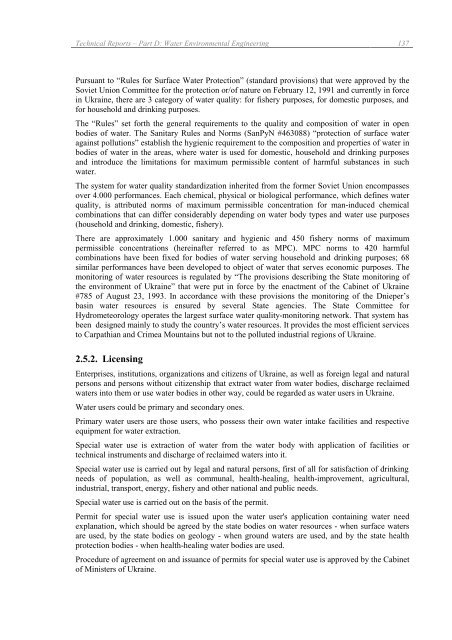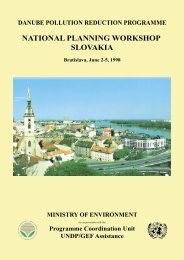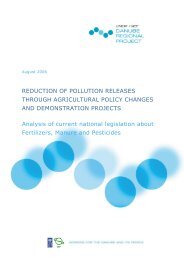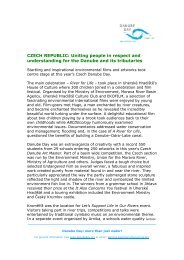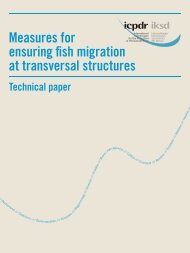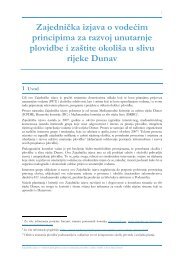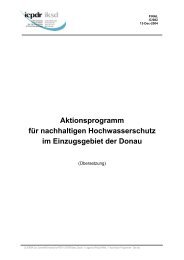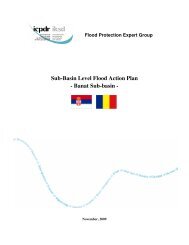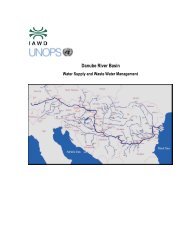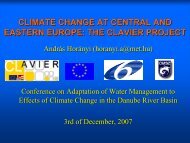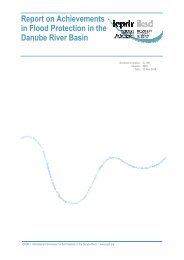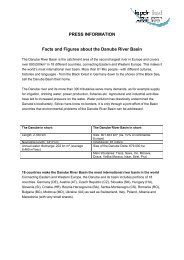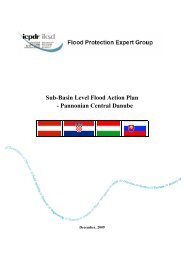Technical Reports Parts C,D - ICPDR
Technical Reports Parts C,D - ICPDR
Technical Reports Parts C,D - ICPDR
Create successful ePaper yourself
Turn your PDF publications into a flip-book with our unique Google optimized e-Paper software.
<strong>Technical</strong> <strong>Reports</strong> – Part D: Water Environmental Engineering 137<br />
Pursuant to “Rules for Surface Water Protection” (standard provisions) that were approved by the<br />
Soviet Union Committee for the protection or/of nature on February 12, 1991 and currently in force<br />
in Ukraine, there are 3 category of water quality: for fishery purposes, for domestic purposes, and<br />
for household and drinking purposes.<br />
The “Rules” set forth the general requirements to the quality and composition of water in open<br />
bodies of water. The Sanitary Rules and Norms (SanPyN #463088) “protection of surface water<br />
against pollutions” establish the hygienic requirement to the composition and properties of water in<br />
bodies of water in the areas, where water is used for domestic, household and drinking purposes<br />
and introduce the limitations for maximum permissible content of harmful substances in such<br />
water.<br />
The system for water quality standardization inherited from the former Soviet Union encompasses<br />
over 4.000 performances. Each chemical, physical or biological performance, which defines water<br />
quality, is attributed norms of maximum permissible concentration for man-induced chemical<br />
combinations that can differ considerably depending on water body types and water use purposes<br />
(household and drinking, domestic, fishery).<br />
There are approximately 1.000 sanitary and hygienic and 450 fishery norms of maximum<br />
permissible concentrations (hereinafter referred to as MPC). MPC norms to 420 harmful<br />
combinations have been fixed for bodies of water serving household and drinking purposes; 68<br />
similar performances have been developed to object of water that serves economic purposes. The<br />
monitoring of water resources is regulated by “The provisions describing the State monitoring of<br />
the environment of Ukraine” that were put in force by the enactment of the Cabinet of Ukraine<br />
#785 of August 23, 1993. In accordance with these provisions the monitoring of the Dnieper’s<br />
basin water resources is ensured by several State agencies. The State Committee for<br />
Hydrometeorology operates the largest surface water quality-monitoring network. That system has<br />
been designed mainly to study the country’s water resources. It provides the most efficient services<br />
to Carpathian and Crimea Mountains but not to the polluted industrial regions of Ukraine.<br />
2.5.2. Licensing<br />
Enterprises, institutions, organizations and citizens of Ukraine, as well as foreign legal and natural<br />
persons and persons without citizenship that extract water from water bodies, discharge reclaimed<br />
waters into them or use water bodies in other way, could be regarded as water users in Ukraine.<br />
Water users could be primary and secondary ones.<br />
Primary water users are those users, who possess their own water intake facilities and respective<br />
equipment for water extraction.<br />
Special water use is extraction of water from the water body with application of facilities or<br />
technical instruments and discharge of reclaimed waters into it.<br />
Special water use is carried out by legal and natural persons, first of all for satisfaction of drinking<br />
needs of population, as well as communal, health-healing, health-improvement, agricultural,<br />
industrial, transport, energy, fishery and other national and public needs.<br />
Special water use is carried out on the basis of the permit.<br />
Permit for special water use is issued upon the water user's application containing water need<br />
explanation, which should be agreed by the state bodies on water resources - when surface waters<br />
are used, by the state bodies on geology - when ground waters are used, and by the state health<br />
protection bodies - when health-healing water bodies are used.<br />
Procedure of agreement on and issuance of permits for special water use is approved by the Cabinet<br />
of Ministers of Ukraine.


